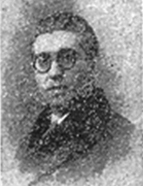

He was also invited to be a member of the teaching staff of the recently founded Faculty of Letters of Porto since a teaching position in the Germanic Philology section had become vacant. Ribeiro, who was working at the time in the Escola Normal Primária Superior (Primary School) and was considered one of the most outstanding figures of his academic generation, accepted the invitation. He thus became part of a teaching body of excellence made up of academics such as Damião Peres, Homem de Cristo, Newton de Macedo and Luis Cardim. In July 1923 he was awarded tenure in this institution and started teaching the courses of Medieval History, Modern and Contemporary History, and General History of Civilisation, becoming the head of the latter in 1930. During his career at the Faculty of Letters of Porto, Ribeiro published some articles in the magazine A Águia and there is also a record of his collaboration on the Faculty’s Revista de Estudos Históricos. In April 1926 he was unanimously awarded the degree of Doctor in Germanic Philology. In this same year he undertook a study trip to the Experimental Phonetics Laboratories in Paris and Hamburg with the idea of setting one up in the Faculty of Letters of Porto.
During the period when he was a professor at the Faculty of Letters, between 1921 and 1931, Ribeiro collaborated on the magnum opus that would become História de Portugal (History of Portugal), better known as “the Barcelos History”, the first and for decades the only general history of the country produced by academics. It was edited by Damião Peres and was published on the occasion of the commemoration of the 800th anniversary of the founding of the nation. Ângelo Ribeiro wrote forty-eight chapters for this work, one in partnership with Damião Peres, spread throughout its six volumes. For this monumental work he composed studies on the Middle Ages, the Modern Age and the Contemporary Era but, however, his greatest output was related to the Medieval period. Of note are the six chapters he wrote on the subject of the history of welfare in Portugal, all now considered works of reference in this field, and the various articles where he wrote short political biographies of some Portuguese monarchs: “O Rei Filósofo” [The Philosopher King], “O Príncipe Perfeito” [The Perfect Prince] and “D. João V” [King John I]. Well versed in political and especially welfare history, Ribeiro gave much emphasis to localisms and decentralisation was a noticeable feature of his discourse. This is proved by various chapters he wrote for the second volume of the work which refer to a variety of places: “Santarém”, “Lisboa”, “Silves”, “Elvas, Mértola, Tavira”…
